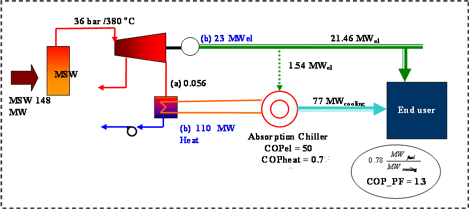Waste Management and Waste-to-Energy Applications in Tropical Urban Areas
In Brief
This project will serve to highlight current difficulties with Municipal Solid Waste (MSW) management in Southeast Asia and will provide specific solutions on how this resource can be effectively utilized. The main objective of this project is to establish sustainable development of MSW management as well as to promote an expansion of biomass-based electricity. The study further aims at clarifying the opportunities for various types of MSW power plants for providing both electricity and cooling in an innovative fashion.
Energy recovery from flue gases in thermal treatment plants is an integral part of MSW management for most industrialized nations. Often cogeneration can be employed for both enhancing the plant profitability and increasing the overall energy yield from this mostly renewable resource.
In tropical locations it is normally difficult to justify traditional cogeneration since there is little need for the heat produced. However the implementation of heat-driven cooling processes such as absorption cooling is extremely attractive in this setting. Detailed system analyses, environmental and economical assessment of MSW management including study of modern waste-to-energy power plants and absorption cooling will be placed in focus.
Different MSW power plants can be installed in order to provide energy for various applications in the tropical areas.
Energy conversion chain for centralized CHP and distributed thermally driven cooling

Period
2008-01-01 - 2010-12-31
Project Lead
Assoc. Prof. Andrew Martin
Researchers
Seksan Udomsri
Professor Torsten H. Fransson
Assoc. Prof. Björn Frostell
Source of Funding
Swedish International Development Cooperaton Agency (SIDA-SAREC)
Keywords
Absorption chillers, Biomass, District cooling, District heating, Energy recovery from MSW, Municipal Solid Waste (MSW), Southeast Asia, Waste-to-energy
